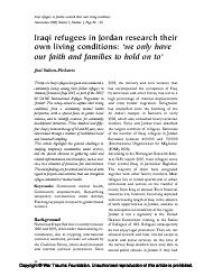Iraqi refugees in Jordan research their own living conditions: 'we only have our faith and families to hold on to'
Thirty-six Iraqi refugees designed and conducted a community survey among their fellow refugees in Amman/Jordan in July 2007, as part of the 2007/08 CARE International Refugee Programme in Jordan1. The survey aimed to capture their living conditions from a community mental health perspective, with a special focus on gender based violence, and to identify resources for community development initiatives. Three hundred and fifty-four Iraqis, between the age of 10 and 86years, were interviewed through a mixture of institution based and ‘snowball’sampling
This article highlights the general challenges to studying temporary communities under distress, and the special obstacles to gathering valid and reliable information on sensitive topics, such as violence, in a situation of pervasive fear and mistrust. The mainfindings are presented and discussed with regard to projects and activities that can strengthen refugee communities’ mental health.
Geachte bezoeker,
De informatie die u nu opvraagt, kan door psychotraumanet niet aan u worden getoond. Dit kan verschillende redenen hebben,
waarvan (bescherming van het) auteursrecht de meeste voorkomende is. Wanneer het mogelijk is om u door te verwijzen naar de bron
van deze informatie, dan ziet u hier onder een link naar die plek.
Als er geen link staat, kunt u contact opnemen met de bibliotheek,
die u verder op weg kan helpen.
Met vriendelijke groet,
Het psychotraumanet-team.
Reference:
Josi Salem-Pickartz | 2009
In: Intervention: the international journal of mental health, psychosocial work and counselling in areas of armed conflict, ISSN 1571-8883 | 7 | 1 | 34-49
http://www.interventionjournal.com/sites/default/files/7.1.%20Salem_0.pdf
In: Intervention: the international journal of mental health, psychosocial work and counselling in areas of armed conflict, ISSN 1571-8883 | 7 | 1 | 34-49
http://www.interventionjournal.com/sites/default/files/7.1.%20Salem_0.pdf


